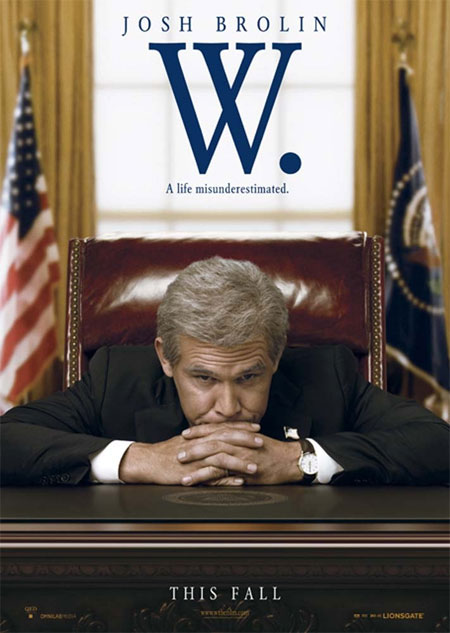On Tuesday 11th November, BULS went on a field trip to watch ‘W’ a biopic on George Bush. Here, a new member, writes his first blog. A review of the film.
‘W’ examines the political career and personal life of George W Bush from his short lived summer jobs and alcoholism to the beginning of the end of his Presidency. ‘W’ is an unusual film, but rather than breaking convention it does more to rearrange and restyle it than anything else.
The film is very subtle in many ways, but also overtly politicised or at least feeling a need to clarify things for the audience by creating a good and a bad guy. Dick Cheney is the latter and Colin Powell the former. This is especially evident in the scene where Bush and his Cabinet discuss the possibility of nuclear weapons in Iraq and the advantages of invading. Cheney’s speech about the reserves of resources in Iraq and the control America could gain over Iran is particularly scathing, especially when he says “There is no get out plan … we stay”. Powell, however, speaks about a small group of extremists changing his country’s entire outlook and policy, generally coming across as representing many of the reasonable American people. And yet, though it may be exaggerated, it comes across as a very convincing representation of these two characters.
The personification of Bush is another quite searing performance, showing him, in his earlier years, as a lazy, irresolute, angry, drunkard, who gained the governorship of Texas only due to his clever speech writer and his personal lust for power. For most of the scenes involving his earlier years, Bush is either drunk or fighting with his father. His relationship with his father is actually an intriguing aspect of the film and shows what we’d never see in the media (if it bears any resemblance to the truth, which seems reasonably likely).
When with his advisers Bush is portrayed as bad mannered, unaware and largely ignorant. For example, when he’s handed a draft bill for “enhanced interrogation techniques utilising fear scenarios”, by Cheney, he crassly remarks “It’s only three pages; good”. It’s also surprising to see how much time the President of the United States of America spends at leisure; casual meals, or strolls, with his colleagues, hamburgers in front of the baseball and long chats with his wife and father, whereas his employees have to work tirelessly to produce speeches for him, without input from the man who’s going to perform them. This only serves to further contribute to his image of idleness,
The worse representation in the film was most likely Tony Blair, but he’s only in it for about two minutes and the film doesn’t seek to examine him in any detail, only briefly showing his opinions on going to war with Iraq.
A fair amount of the film is dedicated to satire, mostly in the form of George’s dense and often very literal answers; when a reporter asks “Mr President, what place do you think you have in history?” his reply is “In history? In history, we’ll all be dead.” There are also many inside jokes and ironies, which hint at what we already know is to come without seeming to do so intentionally. Though some parts of the film are, deadly serious, like when the woman leading Bush through her garden where a BBQ is taking place, stands …; on a corn on the cob and (wait for it) it sinks into the grass! My God; the actors do all their own stunts, you know. Unbelievable. Another first-class clip is the shot of Bush’s belt for a ½ a second – absolutely excellent.
The film does give a good sense of realism, making the audience feel slightly drunk along with Bush, through the camera spinning as he fights with his father or when we don’t see the “trash can” until George drives straight into it, yet the entire thing is so subtly integrated into the film we hardly notice. The people involved in the events of the film also seem to have the effective look of ageing and generally bear a strong resemblance to the character they represent (with the notable exception of Tony Blair). Subtlety is the defining feature of this film, it also makes use of symbolism, such as the lights above W as he bows his head to pray just after winning (or so it seems) the Iraq War, very much resemble a halo (presumably the US public opinion at that point).
The film is fairly entertaining, but doesn’t go as far as to be gripping. It sheds little light on how Bush’s mind works or why exactly he acted the way he did. Instead ‘W’ bears more resemblance to a collection of home movies (obviously much more professional done) from a hidden camera, which jumps forwards and backwards in time alternatively, throughout the film. ‘W’ is more of a relaxed armchair look at Bush’s political and personal life rather than any deep or serious analysis.
Perhaps the film tries to cover too many events in the time available, while still attempting to focus in on the lead up to the Iraq War. Personally I found the film entertaining, subtly scandalous and fairly relaxed. I would have perhaps preferred a greater number of serious, in depth looks at events from his actual Presidency (only the Iraq War is given any real consideration out of all the episodes of his time in office) spanning his initial rise to power right up to the present day, rather like “House of Saddam” on the BBC. However, despite this ‘W’ was still well done, if, at times, giving the impression of being a little exaggerated.
